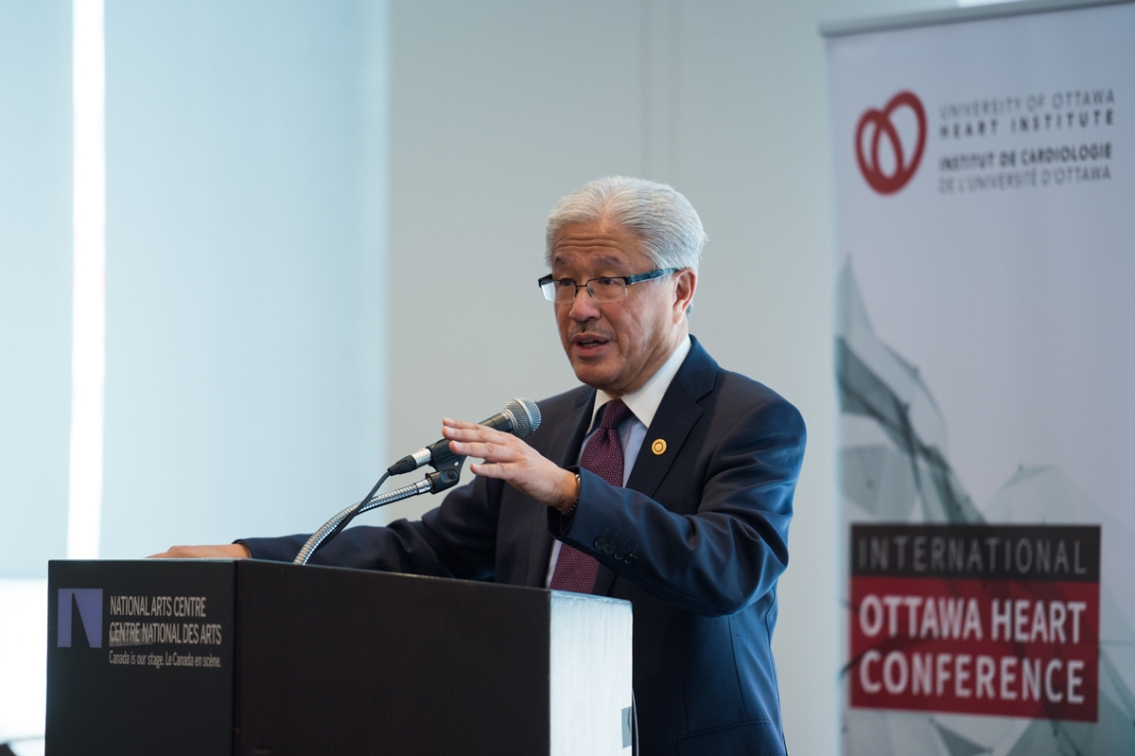Exciting medical discoveries are being fed through our social media feeds and television screens with a seemingly limitless speed and diversity. From breakthroughs like genetic engineering and regenerative medicine to emerging technologies like artificial intelligence and robotic surgery, we live in a time of profound medical innovation. How will this unprecedented progress impact our lives – are we ready for the realities of tomorrow?
When a young Dr. Victor Dzau was still in medical training, the tools available to him and his fellow cardiologists were quite limited by today’s unparalleled standards.
“For treating heart failure, we only had two drugs to offer our patients – digitalis and diuretics,” said the now renowned leader in cardiovascular research and President of the U.S. National Academy of Medicine (NAM) at the 6th International Ottawa Heart Conference (OHC) recently held at the National Arts Centre, entitled Precision Medicine in Cardiovascular Disease. “By comparison, the possibilities available today can be overwhelming due to the giant leaps forward in medical science and innovation in recent decades.”

Presented in collaboration with the Gairdner Foundation, Dr. Dzau was the keynote speaker of a public lecture as part of this year’s OHC. The lecture, which was open to public and free of charge, had the aim of engaging citizens in the excitement of scientific discoveries and their possible implications.
According to Dzau, the strides being made today in science, medicine, and technology have the potential to transform health and medicine even further than in previous years. Notably, advances in basic science, data science, technology, and the convergence of different fields of sciences are all paving the way for remarkable new developments.
The change taking place in medicine is indeed without precedent. Genetic engineering, regenerative medicine and tissue engineering, immuno-cancer therapy, precision medicine, big data and analytics, and artificial intelligence are all simultaneously transforming health and healthcare. In the very near future, these developments promise to deliver a seamless continuum changing how, when, where and by whom care is delivered.
The vision is one where health and healthcare will be connected, precise, democratized and people-centered, with better outcomes for individuals and improved population health. However, key challenges are ahead of us – the extent of adoption, controlling the cost of care and preventing health inequalities.
“Rapid technological advancements will certainly increase the pace of change and create new opportunities, but could also aggravate existing socio-economic disparities,” Dr. Dzau explained. “There will be an urgent need to address access and affordability, as well as concerns these new technologies will increase healthcare costs and raise questions of preparing the current workforce.”
Undoubtedly these issues should be dealt with comprehensively, and collectively, to realize the full potential of future medical science and innovation.
“We’re not doing our jobs as scientists and physicians if we don’t articulate important and emerging issues in science, and involve everyone in the discussion.”
- Dr. Dzau
“While I see a future in front of us which I embrace, I think we can all benefit from thinking carefully about how we to get ready for these changes,” said Dr. Dzau. “How can we develop the right governance, the right knowledge and the right engagement – and do it together as a society?”
Dr. Dzau’s public lecture, entitled “Medical Breakthroughs: What are the Possible Game-Changers in the Near Future? How will they Impact Health and Society?, was delivered at the 6th International Ottawa Heart Conference on April 27, 2018. It can be streamed via Facebook live video below.

